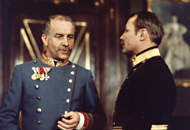Musil's Vision of Feminine & Masculine
I am curious on how we should interpret the role of women in 1900's Vienna. Based on the descriptions of women in Musil, how should we interpret his portrayal? I am thinking of Diotima, her maid, Bonadea, Clarisse, and Leona. What do they have in common and what is different? Is Ulrich their only common ground or is there more that connects them? The broader thought that comes to mind is how Musil defines the feminine and the masculine. What is masculine and what is feminine in 1900's Vienna? How does Musil classify these traits within his characters and how do they conflict? I think that the feminine is fairly ineffectual and negative in Musil's eyes. There seems to be a strong link between the feminine/masculine traits and the descriptions of ethnicity/class in Musil's view. I may be completely off track but it seems like there is a correlation between the negative ideas and feminine roles. I am thinking of Diotima's role in the Parallel Campaign and the portrayal of patriotism. Is femininity associated with negative traits? Are there positive portrayals of feminine virtues? I guess I am just curious about how you all view the portrayal of the feminine and the masculine in Musil's world. I think there is a valuable connection between his portrayal of the masculine/feminine and his portrayal of negative imagery. Especially considering Arnhiem, his slave, and Ulrich I wonder how the masculine /feminine enters the picture.



No comments:
Post a Comment